What Is Thai Vegetable Stir-Fry (Pad Pak Ruam)?
Thai Vegetable Stir-Fry (Pad Pak Ruam) is a Thai home-style dish made by stir-frying mixed vegetables with garlic, fish sauce, and Golden Mountain sauce. It cooks in just 10–15 minutes, producing crisp-tender vegetables with a balanced savory, sweet, and slightly spicy flavor.
Quick Answer: Thai Vegetable Stir-Fry (Pad Pak Ruam)
This colorful, garlicky stir-fry is ready in under 15 minutes, making it perfect for family dinners or quick weekday lunches. The combination of fish sauce and Golden Mountain sauce gives it an unmistakably authentic Thai flavor that elevates everyday vegetables into a delicious, satisfying meal.
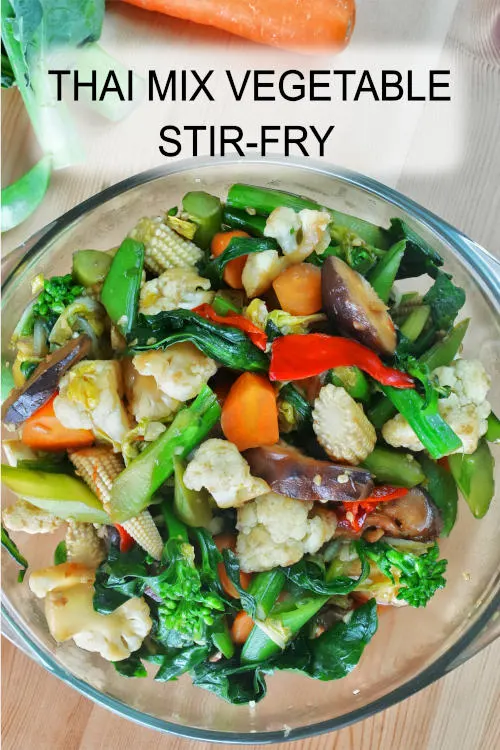
Note: This post may contain affiliate links. Please read my privacy policy for more info. I may receive commissions for purchases made through links in this post. As an Amazon Associate, I earn from qualifying purchases.
First-Hand Experience Cooking Thai Vegetable Stir-Fry
I cooked this Thai vegetable stir-fry at home using fresh vegetables from the local market. It was a weekday family dinner that came together in under 15 minutes. The aroma of garlic and the distinctive flavor of Golden Mountain sauce made it immediately recognizable as Thai cuisine, and my family loved it.
Key Facts About This Vegetable Stir-fry
- Origin: Thailand
- Cooking Time: 10–15 minutes
- Difficulty Level: Easy
- Servings: 2–4
- Special Notes: Optional protein additions include chicken or pork; spiciness is adjustable with Thai bird’s eye chili
How is This Stir-fry Different From the Chinese Version?
Thai vegetable stir-fry is inspired by Chinese-style stir-fry but distinguished by the use of fish sauce and Golden Mountain sauce. Golden Mountain sauce is a Thai soy-based seasoning similar to Maggi seasoning, which adds depth and authenticity to the dish. Unlike many Chinese stir-fries, Thai stir-fry does not use cornstarch slurry, keeping the sauce light and flavorful.
Who Is This For?
- Vegetarians who are looking for a quick, tasty meal
- Busy home cooks needing a fast dinner
- Thai cuisine enthusiasts wanting authentic flavors
- People seeking healthy, colorful vegetable dishes
Is Thai Vegetable Stir-Fry Worth Trying?
Yes, this Thai vegetable stir-fry is worth trying if you love garlic, crisp-tender vegetables, and a perfect balance of sweet, spicy, and savory flavors. It’s quick, easy to cook, and elevates ordinary vegetables into a flavorful meal. Perfect with jasmine rice, it’s suitable for both family dinners and weekday lunches.
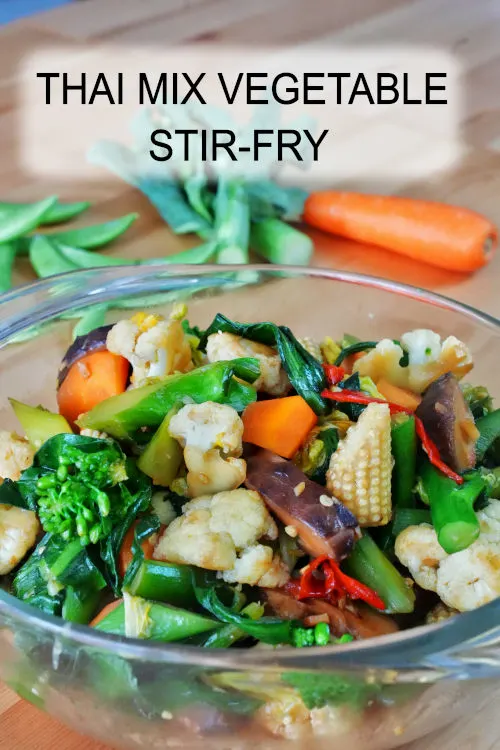
How to Prepare the Stir-Fry Sauce
The stir-fry sauce is made by mixing the following ingredients to create a balanced Thai flavor.
- Fish sauce – adds umami
- Golden Mountain sauce – provides rich and savory flavor
- Oyster sauce (or vegan oyster sauce for vegetarians) – for depth
- Sugar – to balance the saltiness of fish sauce
- Optional: ground black pepper
To prepare, mix all ingredients before adding them to the wok to ensure even flavor distribution.
How to Stir-Fry the Vegetables
Below are the step-by-step instructions on how to prepare Thai mixed vegetable stir-fry. I strongly suggest that you watch the video embedded in the next section of this blog post for a demonstration.
Prepare vegetables:
- Separate Chinese broccoli stems and leaves; slice stems thinly.
- Cut cauliflower into small florets.
- Slice carrots into wedges or thin pieces.
- Halve snow peas and remove fibrous strings.
- Chop cabbage into 2-inch pieces.
- Soak shiitake mushrooms until soft, then slice into strips.
Cook aromatics and vegetables:
- Heat oil in a wok or large skillet over medium heat. Sauté garlic and chilies until fragrant.
- Add cauliflower, cabbage, and carrots; stir-fry 2 minutes, adding a splash of water if needed.
- Add Chinese broccoli stems, shiitake mushrooms, and pre-mixed stir-fry sauce; stir 1–2 minutes.
- Add Chinese broccoli leaves and snow peas; stir-fry 30 seconds over medium-high heat.
- Serve immediately with steamed jasmine rice.
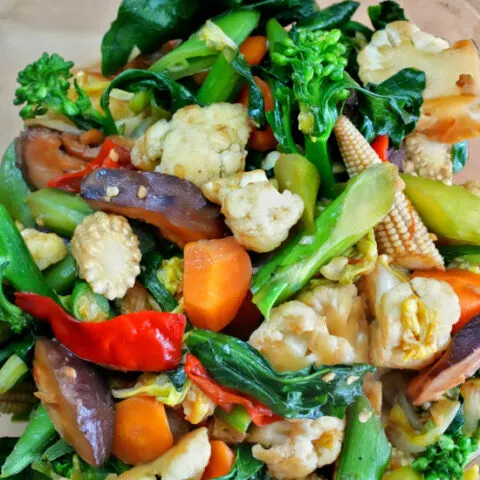
Thai vegetable stir-fry
This Thai mix vegetable stir-fry is garlicky, crisp-tender, and loaded with a spicy, sweet, savory, and garlicky taste. It is a quick and easy vegetarian dish.
Ingredients
Ingredients A (vegetables)
- 200g Chinese broccoli (Gai Lan), separate the stems from the leaves
- 100g cauliflower, cut into small florets
- 50g carrots, cut into wedges
- 20 snow peas, remove the strings, and cut into half
- 6 baby corns
- 70g cabbage, cut into 2/inch pieces
- 5 dried shitake mushrooms, soaked to soften and cut into strip
Ingredients B (others)
- 1 tbsp chopped garlic
- 3 bird’s eye chili, bashed (optional)
- 2 tbsp vegetable oil
Ingredients C (sauce)
- 2 tbsp Golden Mountain sauce
- 2 tbsp fish sauce
- 2 tbsp oyster sauce
- 2 tsp sugar
- 2 tbsp water
Instructions
Preparation
- Separate the Chinese broccoli stems and leaves. Slice the stems thinly on the bias.
- Cut cauliflower into small florets.
- Cut carrots into wedges or thin slices.
- Soak dried shiitake mushrooms in water until soft, then slice into strips.
- Remove the fibrous string from snow peas and cut each in half.
- Chop cabbage into 2-inch pieces.
Cooking
- Heat vegetable oil in a wok or large skillet over medium heat. Sauté garlic and bashed chilies until fragrant.
- Add cauliflower, cabbage, and carrots. Stir-fry for 2 minutes, adding a few splashes of water if the pan is too dry.
- Add Chinese broccoli stems, shiitake mushrooms, and pre-mixed stir-fry sauce (Ingredients C). Stir-fry for 1–2 minutes until evenly coated.
- Add Chinese broccoli leaves and snow peas. Stir-fry over medium-high heat for 30 seconds.
- Serve immediately with steamed jasmine rice.
Recommended Products
As an Amazon Associate and member of other affiliate programs, I earn from qualifying purchases.
-
 Pre-Seasshioned Cast Iron Skillet 2-Piece Set (10-Inch and 12-Inch) Oven Safe Cookware - 2 Heat-Resistant Holders - Indoor and Outdoor Use - Grill, Stovetop, Induction Safe
Pre-Seasshioned Cast Iron Skillet 2-Piece Set (10-Inch and 12-Inch) Oven Safe Cookware - 2 Heat-Resistant Holders - Indoor and Outdoor Use - Grill, Stovetop, Induction Safe -
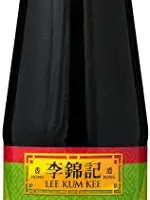 Lee Kum Kee Vegetarian Oyster Flavoured Sauce - 510 Grams
Lee Kum Kee Vegetarian Oyster Flavoured Sauce - 510 Grams -
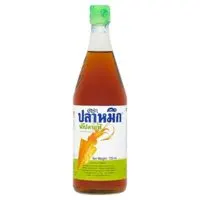 Squid Fish Sauce 725ml
Squid Fish Sauce 725ml -
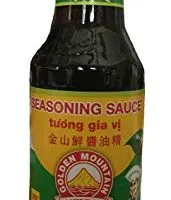 Golden Mountain Seasoning Soybean Sauce - 6.8 fl oz bottle
Golden Mountain Seasoning Soybean Sauce - 6.8 fl oz bottle
Nutrition Information:
Yield: 3 Serving Size: 1Amount Per Serving: Calories: 1203Total Fat: 47gSaturated Fat: 12gTrans Fat: 0gUnsaturated Fat: 24gCholesterol: 101mgSodium: 3358mgCarbohydrates: 127gFiber: 37gSugar: 56gProtein: 76g
This data was provided and calculated by Nutritionix on 19/12/2022
Practical Tips I want to share
- Use oils with a high smoke point, such as peanut, canola, or corn oil. Coconut oil can be used to add an authentic Thai aroma.
- Optional: Thai bird’s eye chili for spiciness; lightly smash the chilies rather than chopping
- Optional: Drizzle sesame oil before serving for extra flavor.
Frequently Asked Questions
1. Is Thai vegetable stir-fry vegetarian?
Yes, this recipe is vegetarian if you use vegan oyster sauce. Adding meat turns it into a non-vegetarian dish.
2. Can I use other vegetables?
Yes, bell peppers, bok choy, yellow squash, green beans, and Thai basil can also be used.
3. How long does it take to cook?
About 10–15 minutes, depending on the vegetables’ size and type.
4. What sauce substitutes can I use?
Soy sauce can replace Golden Mountain sauce in a pinch, and vegan oyster sauce can replace oyster sauce for vegetarian versions.
5. Should I serve it with rice?
Yes, jasmine rice is the traditional accompaniment and complements the flavors perfectly.
Related Thai Dishes You May Want to Try
Below are two Thai dishes I highly recommend if you enjoy authentic Thai food:
- Pad Thai: Classic Thai stir-fried noodle dish, quick and easy for first-time cooks.
- Thai Green Curry: Creamy, flavorful curry served with rice, perfect for a quick Thai meal at home.

Julia
Saturday 17th of May 2025
Thank you for this recipe! I just wanted to ask-is it possible to use frozen veg and when would I add it then? Thank you, Julia
KP Kwan
Saturday 17th of May 2025
While frozen vegetables can be used, I prefer fresh ones for their taste and texture.
Spicy Eggplant Recipe with Sichuan Flavor 鱼香茄子
Wednesday 9th of April 2025
[…] variety for your lunch or dinner, you can prepare some Chinese food such as lotus root soup and a stir-fried vegetable side dish to complement the spicy eggplant […]
Easy Spicy Garlic Chicken with Sichuan & Cantonese Flavors
Saturday 1st of March 2025
[…] the chicken is spicy, I recommend serving it with simple vegetables. Stir-fried bok choy or mixed vegetables work well. I also like to include soup in the meal. One of my favorites is a Chinese herbal soup. […]
Mango Chicken recipe - delicious crispy chicken with mango cubes
Thursday 27th of February 2025
[…] the mango chicken is mildly spicy and lacks vegetables, I recommend preparing Thai-style mixed vegetables as a side. Also, if you enjoy soup, I suggest making a simple vegetable soup to serve alongside […]
KP Kwan
Sunday 25th of December 2022
Hi, this is KP Kwan. I am happy to see you in this comment area, as you have read through my recipe. I am glad to reply to any questions and comments as soon as possible.
Yohini Ariyanayagam
Tuesday 3rd of January 2023
@KP Kwan, Where I buy Golden Mountain sauce in Uk